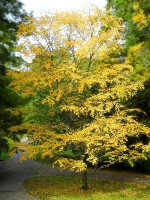Mon-Fri 9am - 5pm Mountain time
Royal Frost Birch vs Sweet Birch (Black Birch)
Betula x Royal Frost
Betula lenta
NOT AVAILABLE THIS SEASON - MIGHT RETURN
NOT AVAILABLE THIS SEASON - MIGHT RETURN
Royal Frost Birch is a beautiful, cold hardy tree. It features burgundy-red-purple foliage, turning a showy yellow-orange-red in fall. The attractive white bark is striking on a winter landscape.
Royal Frost Birch loves moisture. To meet this trees' moisture needs, try applying bark mulch over the root system. Keep in mind that this variety only likes to be pruned in summer to avoid “bleeding” sap.
The Royal Frost cultivar is popular for its upright pyramidal growth habit and fuller purple foliage.
Sweet Birch (Black Birch) is an attractive tree with a rounded shape native to eastern North America that would be a good addition to landscapes. It has a conical growth shape when young and as it ages the shape becomes more rounded. When the leaves, shoots, or bark are crushed they give off a sweet scent, which is what gives the Sweet Birch its name.
In early spring, the trees can be tapped and the sap used to produce syrup or fermented and made into birch beer. Pollinators and birds are attracted to the Sweet Birch as the pollen and seeds serve as a good food source. In the fall, the leaves turn golden yellow which will brighten your landscape.
The inner bark has a strong wintergreen scent and has been used to produce oil of wintergreen. Small twigs and bark of the tree can be boiled in water to make a tasty Sweet Birch tea.

